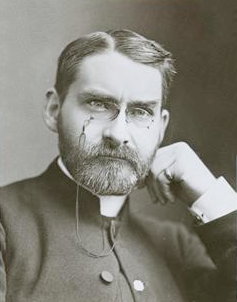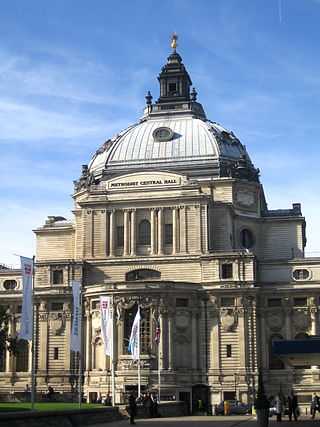Methodism, also called the Methodist movement, is a Protestant Christian tradition whose origins, doctrine and practice derive from the life and teachings of John Wesley. George Whitefield and John's brother Charles Wesley were also significant early leaders in the movement. They were named Methodists for "the methodical way in which they carried out their Christian faith". Methodism originated as a revival movement within Anglicanism originating out of the Church of England in the 18th century and became a separate denomination after Wesley's death. The movement spread throughout the British Empire, the United States and beyond because of vigorous missionary work, and today has about 80 million adherents worldwide.
The United Methodist Church (UMC) is a worldwide mainline Protestant denomination based in the United States, and a major part of Methodism. In the 19th century, its main predecessor, the Methodist Episcopal Church, was a leader in evangelicalism. The present denomination was founded in 1968 in Dallas, Texas, by union of the Methodist Church and the Evangelical United Brethren Church. The UMC traces its roots back to the revival movement of John and Charles Wesley in England, as well as the Great Awakening in the United States. As such, the church's theological orientation is decidedly Wesleyan. It embraces liturgical worship, holiness, and evangelical elements.

John Wesley was an English cleric, theologian, and evangelist who was a leader of a revival movement within the Church of England known as Methodism. The societies he founded became the dominant form of the independent Methodist movement that continues to this day.

Ecumenism – also called interdenominationalism, or ecumenicalism – is the concept and principle that Christians who belong to different Christian denominations should work together to develop closer relationships among their churches and promote Christian unity. The adjective ecumenical is thus applied to any non-denominational initiative that encourages greater cooperation and union among Christian denominations and churches.

Nonconformists were Protestant Christians who did not "conform" to the governance and usages of the state church in England, and in Wales until 1914, the Church of England.

The National Council of the Churches of Christ in the USA, usually identified as the National Council of Churches (NCC), is the largest ecumenical body in the United States. NCC is an ecumenical partnership of 38 Christian faith groups in the United States. Its member communions include mainline Protestant, Eastern Orthodox, Oriental Orthodox, African-American, evangelical, and historic peace churches. Together, it encompasses more than 100,000 local congregations and 40 million adherents. It began as the Federal Council of Churches in 1908, and expanded through merger with several other ecumenical organizations to become the National Council of Churches in 1950. Its Interim President and General Secretary is Bishop Vashti Murphy McKenzie.

The Institute on Religion and Democracy (IRD) is an American Christian conservative think tank that promotes its views among mainline Protestant churches, as well as advocating for its values in the public square. Its critics claim that it has been instrumental in attacking mainline Protestant denominations in the United States including the United Methodist Church.
Ronald James Sider, was a Canadian-born American theologian and social activist. He was the founder of Evangelicals for Social Action, a think-tank which seeks to develop biblical solutions to social and economic problems through incubating programs that operate at the intersection of faith and social justice.
Albert Cook Outler was a 20th-century American Methodist historian, theologian, and pastor. He was a professor at Duke University, Yale University, and Southern Methodist University. He was a key figure in the 20th-century ecumenical movement.

Hugh Price Hughes was a Welsh Methodist clergyman and religious reformer. He served in multiple leadership roles in the Wesleyan Methodist Church. He organised the West London Methodist Mission, a key Methodist organisation today. Recognised as one of the greatest orators of his era, Hughes also founded and edited an influential newspaper, the Methodist Times in 1885. His editorials helped convince Methodists to break their longstanding support for the Conservatives and support the more moralistic Liberal Party, which other Nonconformist Protestants already supported.
The Methodist Church of Great Britain is a Protestant Christian denomination in Britain, and the mother church to Methodists worldwide. It participates in the World Methodist Council, and the World Council of Churches among other ecumenical associations.
Connexionalism, also spelled connectionalism, is the theological understanding and foundation of Methodist ecclesiastical polity, as practised in the Methodist Church in Britain, Ireland, Caribbean and the Americas, United Methodist Church, Free Methodist Church, African Methodist Episcopal and Episcopal Zion churches, Bible Methodist Connection of Churches, Christian Methodist Episcopal Church, and many of the countries where Methodism was established by missionaries sent out from these churches. It refers to the way in which Methodist churches and other institutions are connected and work together to support one another, share resources, and carry out mission and ministry. The United Methodist Church defines connection as the principle that "all leaders and congregations are connected in a network of loyalties and commitments that support, yet supersede, local concerns." Accordingly, the primary decision-making bodies in Methodism are conferences, which serve to gather together representatives of various levels of church hierarchy.

The organisation of the Methodist Church of Great Britain is based on the principle of connexionalism. This means that British Methodism, from its inception under John Wesley (1703–1791), has always laid strong emphasis on mutual support, in terms of ministry, mission and finance, of one local congregation for another. No singular church community has ever been seen in isolation either from its immediately neighbouring church communities or from the centralised national organisation. Wesley himself journeyed around the country, preaching and establishing local worshipping communities, called "societies", often under lay leadership. Soon these local communities of worshipping Christians formalised their relationships with neighbouring Methodist communities to create "circuits", and the circuits and societies contained within them, were from the very beginning 'connected' to the centre and Methodism's governing body, the annual Conference. Today, societies are better known as local churches, although the concept of a community of worshipping Christians tied to a particular location, and subdivided into smaller cell groups called "classes", remains essentially based on Wesley's societies.
Timothy C. Tennent is an American Methodist theologian. He is the current president of Asbury Theological Seminary.
The "Manhattan Declaration: A Call of Christian Conscience" is a manifesto issued by Eastern Orthodox, Catholic, and evangelical Christian leaders to affirm support of "the sanctity of life, traditional marriage, and religious liberty". It was drafted on October 20, 2009, and released November 20, 2009, having been signed by more than 150 American religious leaders. On the issue of marriage, the declaration objects not only to same-sex marriage but also to the general erosion of the "marriage culture" with the specter of divorce, greater acceptance of infidelity and the uncoupling of marriage from childbearing. The declaration's website encourages supporters to sign the declaration, and it counts 551,130 signatures as of July 18, 2015.

Protestantism is a branch of Christianity that emphasizes justification of sinners through faith alone, the teaching that salvation comes by unmerited divine grace, the priesthood of all believers, and the Bible as the sole infallible source of authority for Christian faith and practice. The five solae summarize the basic theological beliefs of mainstream Protestantism.
The Wesleyan Methodist Church was the majority Methodist movement in England following its split from the Church of England after the death of John Wesley and the appearance of parallel Methodist movements.

The history of Methodism in the United States dates back to the mid-18th century with the ministries of early Methodist preachers such as Laurence Coughlan and Robert Strawbridge. Following the American Revolution most of the Anglican clergy who had been in America came back to England. John Wesley, the founder of Methodism, sent Thomas Coke to America where he and Francis Asbury founded the Methodist Episcopal Church, which was to later establish itself as the largest denomination in America during the 19th century.
Pentecostalism is a renewal movement within Protestant Christianity that places special emphasis on a direct personal relationship with God and experience of God through the baptism with the Holy Spirit. For Christians, this event commemorates the descent of the Holy Spirit upon the followers of Jesus Christ, as described in the second chapter of the Book of Acts. Pentecostalism was established in Kerala, India at the start of the 20th century.
The Evangelical Methodist Church of America Christian denomination based in the United States. Ardently Fundamental, the denomination has its roots in a movement of churches that broke away from Mainline Methodism in the 1940s and 50s.









